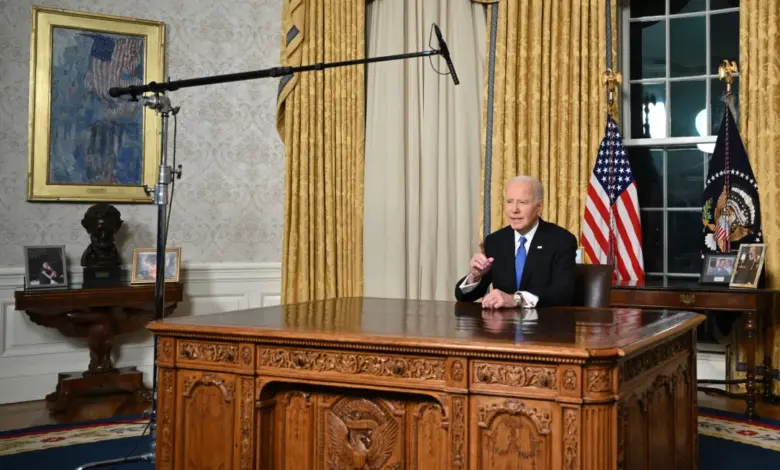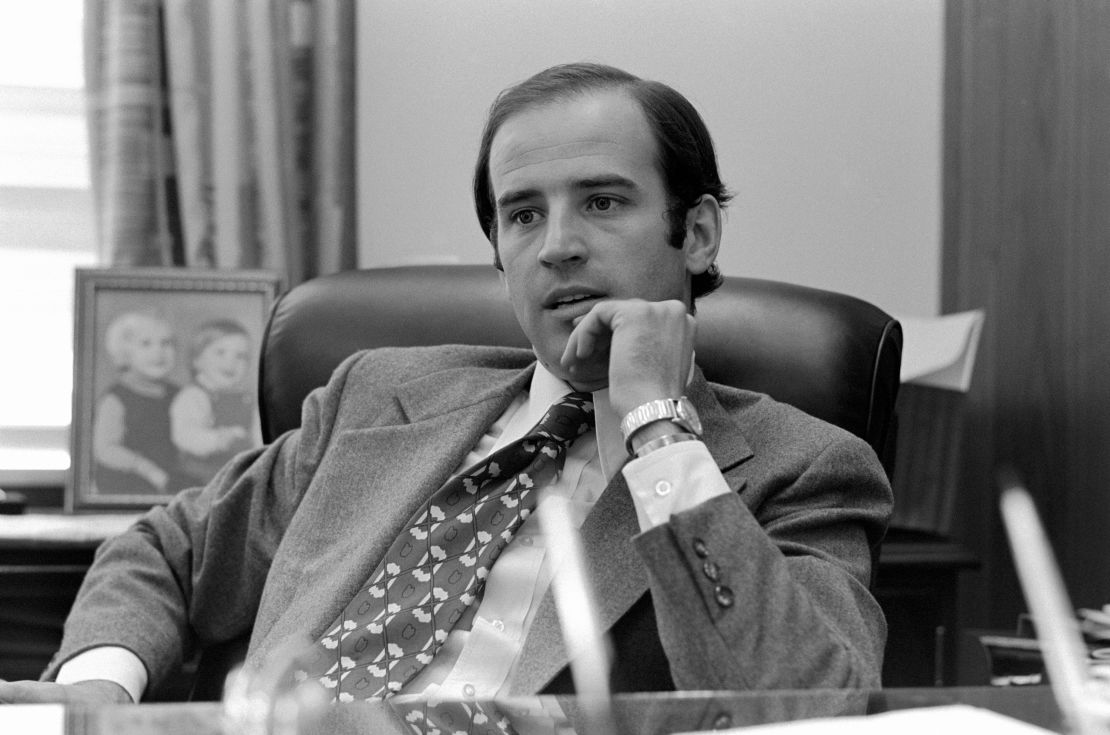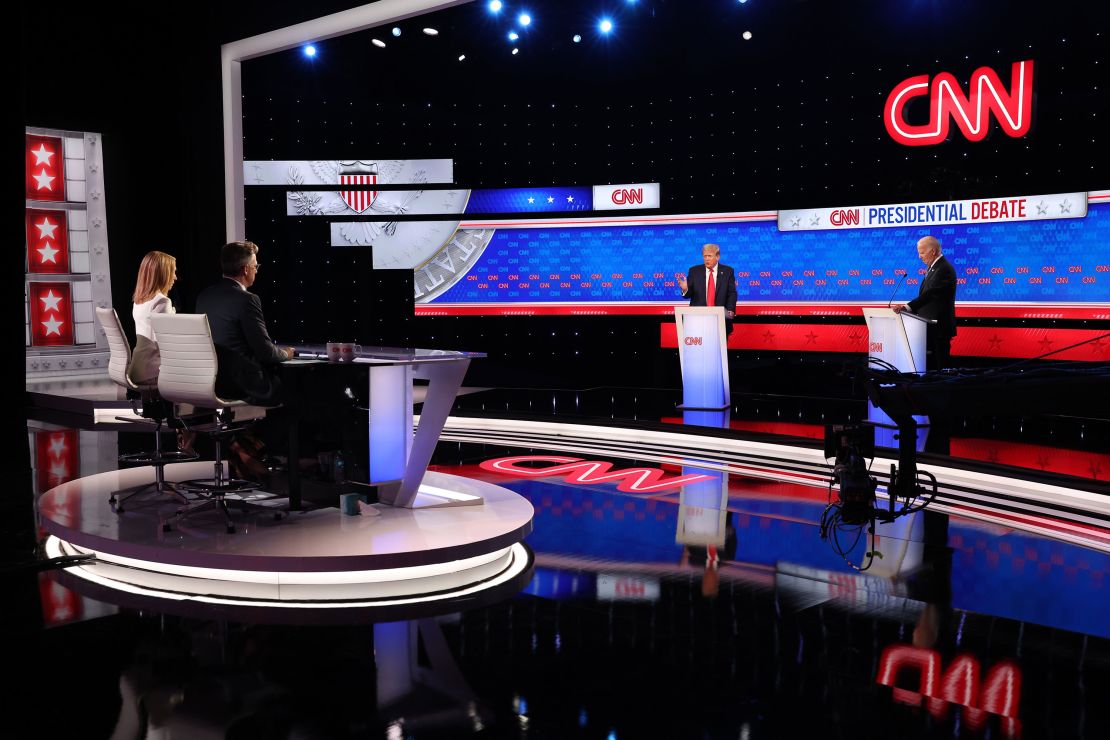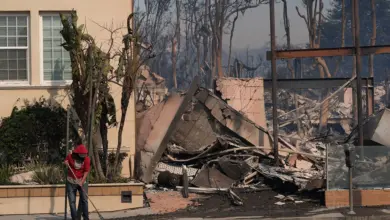
But he didn’t build it to a promised new Democratic generation.
Instead, he’s the president who stayed too long and whose administration thus arched between two terms of a nemesis he once defeated and then let back into power: Donald Trump.
To call this Biden’s political tragedy would be crass. This, after all, is a man who lived unending personal anguish after burying his first wife and two of his children. But it’s the fate he’s been handed by history — and his own grave electoral miscalculation.
This dark reality shadowed Biden’s farewell address on Wednesday night — his latest attempt to write a first draft of history about a presidency he insists is worth far more than the ignominy of a single term.
“My eternal thanks to you, the American people,” the president said from the Oval Office at just after 8 p.m. on the East Coast. “After 50 years of public service, I give you my word I still believe in the idea for which this nation stands, a nation where the strengths of our institutions and the character of our people matter and must endure.”
But by Monday afternoon, the foe who Biden warned in 2020 represented a mortal threat to America’s soul will be back behind the Oval Office desk, with Biden headed into a Delaware retirement and leaving the country to face whatever happens next.
With this in mind, Biden used his address to warn of the threat he thinks Trump’s second term — and what he styled as his successor’s band of “robber barons” — represents. If anything, he appears to believe the existential peril is greater now that it was when he launched his 2020 campaign.
“Tonight, I want to warn the country of some things that give me great concern,” Biden said. He cited “a dangerous concentration of power in the hands of a very few ultra wealthy people” and sounded an alarm about “dangerous consequences if their abuse of power is left unchecked.”
Like President George Washington in his farewell address, Biden warned of storms gathering around democracy.
“Today, an oligarchy is taking shape in America of extreme wealth, power and influence that literally threatens our entire democracy, our basic rights and freedoms and a fair shot for everyone to get ahead,” he said.
And echoing President Dwight Eisenhower, who conjured the threat posed by the military industrial complex as he exited the White House, Biden spoke of a new age of danger posed by social media and artificial intelligence and the tech bro billionaires and millionaires who are packing Trump’s incoming administration.
“I’m equally concerned about the potential rise of a tech industrial complex that can pose real dangers for our country as well,” Biden said. “Americans are being buried under an avalanche of misinformation and disinformation, enabling the abuse of power. The free press is crumbling … social media is giving up on fact checking. The truth is smothered by lies told for power and for profit.”
Biden was resolute and collected as he spoke, with a photo of his late son Beau, who died of brain cancer, on the table over his left shoulder. The burden of a grueling four-year presidency that is ending in his ninth decade was poignantly evident, however, in his reedy voice and the slurring of his words. If Biden is still up to the act of being president, age robbed him of the power to sell his ideas and to paint the national narrative months ago.
Viewers were left to wonder how Biden had ever concluded he’d be fit to serve out a full second term that would have taken him to the age of 86.
The end of a career and a political era
Biden was not just saying goodbye to the country Wednesday evening.
He drew down the blinds on the only adult life he’s ever known — his decades as a senator, vice president and president and the unslaked ambition that sustained him through rounds of personal torment. He arrived in Washington as a young senator, already tipped as a future commander in chief, half a century ago.

Back then, Mao Zedong led China, Leonid Brezhnev ruled the Soviet Union with an iron fist and Richard Nixon worked in the office from where Biden spoke on Wednesday.
So, the 82-year-old president was closing a political era — and a link with the 20th century and a worldview that he shared with all of his modern predecessors, but one, that was built around the system of American alliances that won the Cold War.
Biden was born in 1942, when Franklin Roosevelt was in the White House, but will cede power at noon on Monday to a successor who seems bent on tearing down the West’s geopolitical infrastructure first envisioned by FDR.
One of the ironies of Biden’s long, excruciating goodbye that has unfolded since Vice President Kamala Harris lost the November election was that, on paper at least, he can lay claim to one of the more successful one-term presidencies.
Biden brought the US economy back from the Covid-19 pandemic so badly managed by Trump with greater growth and job creation than all of America’s top competitors. His legislative haul is more impressive than Trump’s first term and the two terms of both Barack Obama and George W. Bush. Some would say he’s the most prolific signer of consequential laws since Lyndon Johnson in the 1960s after passing big pandemic recovery bills, a rare bipartisan infrastructure measure and new laws to revive manufacturing and to create a new American semi-conductor industry. He cut the price of some prescription drugs, an achievement that was overshadowed by Trump’s return when it recently went into force.
He pointed out that these bills may have significant long-term impacts that long outlast his presidency. They are the key to any potential reassessment of the Biden legacy in decades to come. All were designed by working-class Joe Biden from Scranton, Pennsylvania, to uplift the working class, which was spurned in an age of globalization and got less than most in Trump’s huge first-term tax cut. The irony, however, is that the Democratic blue-collar base fell on his watch, completing Trump’s transformation of the GOP and paving his way back to power.
Abroad, Biden stepped into the vacuum left by Trump’s first-term contempt for America’s allies. He managed to save Ukraine from Russia’s illegal and cruel invasion while avoiding tipping the United States into a war with a nuclear-armed rival. Presidents don’t get credit in their time for catastrophes that are avoided. But this critical achievement is often ignored by hawks who complain that Biden gave Ukraine sufficient weapons to survive but not to win.
In Asia, Biden tightened US alliances and largely adopted Trump’s confrontational turn toward China. But his crowing that “America is back” after he ejected his predecessor from the White House now rings hollow among world leaders under siege from global populism who must now deal with Trump’s return.
A presidency rejected by the nation
Biden will leave office at a point when an overwhelming majority of Americans have turned their back on his presidency.
His approval rating is matching its lowest-ever ebb, according to a new CNN/SSRS poll published Wednesday. Even fewer rate his performance positively on immigration (31%), foreign affairs (32%) or the economy (33%).
In retrospect, Biden’s term foundered on four historic errors, which involved the White House telling Americans that events they could see unfolding with their own eyes were not in fact happening.
- The administration never really understood the gut punch inflation inflicted upon Americans — as evidenced by the president’s off-key “Bidenomics” victory lap. The insistence that high prices were “transitory” set off a slow-motion political disaster.
- Officials’ months of insisting there was no “crisis” at the southern border also misjudged the country’s mood and concern about undocumented migration, which intersected with feelings of widespread insecurity encompassing fear of crime and families’ economic struggles — all of which Trump exploited.
- Biden insists to this day that he was right to end America’s longest war in Afghanistan. But his claim to be a foreign policy expert was shattered by haunting images of refugees clinging to US planes taking off from Kabul amid the Taliban’s advance and the deaths of 13 US service personal in a suicide bombing during a chaotic evacuation.
- But it was Biden’s insistence that he could beat Trump again that led to the painful eclipse culminating in Wednesday’s farewell address. He made the decision to run despite polls that showed Americans believed he was too old and testimony of voters who consistently gave the same message.
How a disastrous debate led to Wednesday’s farewell

In truth, Biden’s presidency effectively ended in 10 excruciating minutes in Atlanta in June, when his advanced age and blurred mental capacity were laid bare in a CNN debate with Trump. With one devastating jab, after an incomprehensible Biden statement, the Republican nominee said what millions at home were thinking: “I really don’t know what he said at the end of that sentence. I don’t think he knows what he said, either.”
Clips of that encounter will be played — likely alongside a younger Ronald Reagan’s dismissal of the age question — as long as televised debates take place.
Future generations won’t remember the younger Biden — the wisecracking, handsome senator and politician who kept getting knocked down by life but who always got up, or the grandpa with a twinkle in his eye and an ocean of empathy in his heart whom voters chose in 2020 to restore some semblance of normality amid the pandemic. They’ll see him at his most frail and ineffective. And unlike Jimmy Carter, whom Biden eulogized in one of his last acts as president, the outgoing commander in chief will not get decades to refashion the reputation of his single term.
As he closed his address, with his political energy all but exhausted, Biden was like the aged magician Prospero in Shakespeare’s “The Tempest,” alone on the stage when his “charms are all o’erthrown.”
“Now it’s your turn to stand guard. May you all be the keeper of the flame, may you keep the faith,” Biden told the country.
“I love America. You love it too. God bless you all.”




